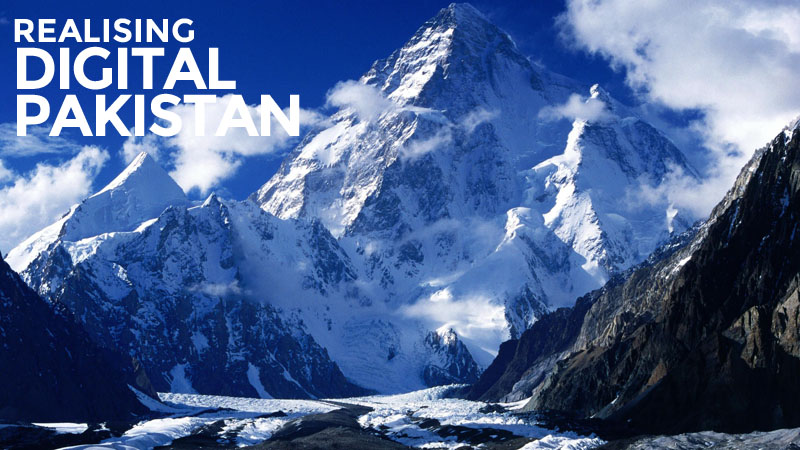Today Telenor held an event for the launch of a report “Realizing Digital Pakistan” in Islamabad. The event was attended by Syed Ismail Shah (Chairman PTA), Anusha Rahman Khan (Minister of IT), Michael Foley (CEO of Telenor Pakistan) and many other big names from Telenor and Pakistan’s IT industry.
At the event, Telenor disclosed their five targets in alignment with the government of Pakistan’s “Pakistan 2025 – One Nation, One Vision.” Pakistan 2025 is a report which was released by the Ministry of Planning, Development & Reform under the supervision of Mr. Ahsan Iqbal. The report brought to light some facts. Over the last decade, Pakistan’s per capita income has grown at 3% per year, while for countries like India, Bangladesh, Sri Lanka the same figure lies between 6-9% per year. These slower growth trends highlight some very common problems faced in Pakistan – social frustrations, poor health and sanitary conditions, lower wages and a very prominent lack of autonomy at the national level.
The Vision 2025 plan will serve four functions:
- First, it will be a compilation of the consensus views of national and international stakeholders regarding the future direction of the country.
- Second, it will be an aspirational document setting out future goals and expectations, to be translated into a concrete road map and coherent strategy for balanced human, social, and economic development.
- Third, it will provide a conceptual platform for the revival of sustainable and inclusive growth, benefiting all citizens of Pakistan, strengthening of the development foundation and enabling the country to achieve international development goals within their respective time frames, and achieving the high level of human development and national autonomy associated with a high-income status before the centennial anniversary of the creation of Pakistan.
- Finally, it will provide the indigenous conception and approach for meeting all globally agreed targets, including the Millennium Development Goals and any new goals to be endorsed by Pakistan in the international arena.
Telenor believes that Pakistan has the potential to transition from a low to middle economy country in the next decade – provided we adopt digital solutions for our pressing current challenges. According to them, digital technology has what it takes to help the government achieve the agenda mentioned in the Vision 2025 report. Telenor’s report Realizing Digital Pakistan contributes to the Vision 2025 by laying out a road map for achieving most of its goals and indicating that, in five years or less, Pakistan could have the same ICT indicators as Malaysia, allowing us to finally clinch the middle-income country status.
The report is based on the following five pillars:
- Launch of digital services for education, health and agriculture sector for a digitally connected Pakistan.
- Digitizing government services to increase transparency and efficiency.
- Strengthning the ecommerce industry of Pakistan through launch of mobile payments and utilizing mobile identities of individuals.
- Launch of internet hubs and incubators to solve problems through innovative solutions. And strengthening the Digital Innovation Ecosystem.
- Connecting all cities and towns with national high speed fibre network.

Goal 1: Connect all schools and hospitals to broadband Internet access, and provide all farmers with mobile access
To catalyze improvements in the health sector, the best urban hospitals need to be connected to rural hospitals and health clinics via broadband Internet. Special focus will be paid to mHealth, mEducation and mAgriculture. Mobile Health initiative will allow people in rural areas to be connected with state-of-the-art medical equipment and services in urban hospitals. mEducation will focus on providing top quality education in places where there is lack of good teachers. mAgriculture will focus on providing farmers with real-time data that will help them in improving the quality of their work.
USF Funds will be leveraged to assure broadband Internet connectivity between rural and urban areas. Furthermore, partnerships between the public and private sector will be urged in order to develop pilots on mHealth, mAgriculture and mEducation.

Goal 2: Triple the 2015 total value of e-Commerce in Pakistan by 2020
The rapidly developing Business to Customer (B2C) e-Commerce market in Pakistan has a lot of potential. One main aim of the report is to avoid restrictive legislation and taxation, in order to let eServices thrive and to build trust in the security of online services. There is also a huge potential to boost software exports and outsourcing suggested by the success of the freelance sector, the ability of Pakistani IT workers to win international awards and a large highly-qualified, English-speaking workforce.
Mobile operators will be urged to leverage mobile identity backed by bio-metric identification to authenticate all e-Commerce transactions, an e-Procurement platform will sought after for government procurement and an enhanced trade diplomacy will take shape to promote software exports.

Goal 3: Increase transparency and access to government budgets, policies and services.
In order to promote accountability and transparency in the government, e-governance will be promoted even further. The aim is to bridge the gap between the public’s demand for government services and the actual availability of services.
It is hoped that the government will develop a central portal giving access to all their agencies, apps and facilitate access to their data to promote app development. The web will offer civil society an effective mechanism for monitoring the government’s performance at all levels.

Goal 4: Pakistan to establish next-generation iHub technology incubators to resolve local challenges by leveraging technology
In the recent years, Pakistan has seen a lot of boost in the entrepreneurship sector. It is hoped to be boosted even further by the setting up technology incubators and facilitating entrepreneurs with seed money. The key to achieving this, once again, will be partnerships between the public and private sector. The government, operators, technology vendors and academia can work together to provide facilities, greenfield funding and general mentoring for budding entrepreneurs and technology developers with government agencies and companies posing challenges.
An iHub is expected to be set up in Islamabad withing the new Technology Park which will see the partnerships between operators and technology suppliers. It is also an aim to spread the “Islamabad Experience” to other cities.

Goal 5: Pakistan to achieve digital connectivity indicators similar to Malaysia by 2020
We’ve been talking about digitization for quite some time now, and it can only be achieved if there is affordable internet broadband access for all. This is a fundamental requirement to achieve a digital economy and a perfectly networked society.
The government of Pakistan needs to take steps to strengthen the fibre backbone of Pakistan, making sure that all cities are connected via a national high-speed fibre network. For that purpose the use of USF Funds, technology agreement with the World Trade Organization (WTO) and reduction of all activation and service taxed by 25% from 2016 to 2020 has been suggested.
This is quite an ambitious set of targets put forth by Telenor which can only be achieved by proper coordination between the government, the academia, the private sector and the civil society. The need of the hour is to align government policies and regulations, private investment, academic know-how and civil society activism for digitization to benefit all. With keen supervision of the Prime Minister’s office, the joint effort of the aforementioned sectors can make sure that Pakistan eventually transitions to a middle-income country by 2025.
You can download the complete report from here.
Image source for cover – PakistanConnections Some facts and figures taken from Ministry of Planning.





 This ecommerce venture is moving South Asia’s artisanal industry on the internet
This ecommerce venture is moving South Asia’s artisanal industry on the internet